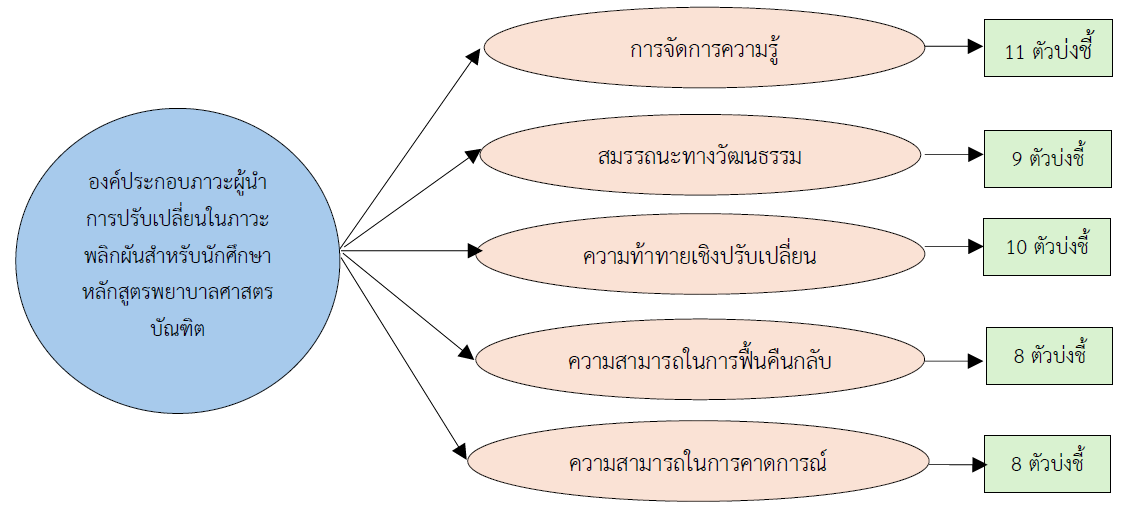องค์ประกอบและตัวบ่งชี้ของภาวะผู้นำการปรับเปลี่ยนในภาวะพลิกผัน สำหรับนักศึกษาหลักสูตรพยาบาลศาสตรบัณฑิต
คำสำคัญ:
องค์ประกอบ, ตัวบ่งชี้, ภาวะผู้นำการปรับเปลี่ยน, ภาวะพลิกผันบทคัดย่อ
การวิจัยเชิงสำรวจนี้มีวัตถุประสงค์เพื่อวิเคราะห์องค์ประกอบและตัวบ่งชี้ของภาวะผู้นำการปรับเปลี่ยนในภาวะพลิกผัน สำหรับนักศึกษาหลักสูตรพยาบาลศาสตรบัณฑิต กลุ่มตัวอย่างเป็นหัวหน้าและรองหัวหน้าพยาบาลประจำหอผู้ป่วยหรือแผนกผู้ป่วยทั้งในโรงพยาบาลรัฐและเอกชนใน 14 จังหวัดภาคใต้ จำนวน 500 คน ใช้วิธีการสุ่มแบบแบ่งชั้นภูมิ เครื่องมือที่ใช้เป็นแบบสอบถามคุณลักษณะสำคัญของภาวะผู้นำการปรับเปลี่ยนในภาวะพลิกผันที่ผู้วิจัยสร้างขึ้น ได้ค่าความตรงระหว่าง .67 - 1.00 และค่าความเชื่อมั่นสัมประสิทธิ์อัลฟาของครอนบาคเท่ากับ .98 เก็บรวบรวมข้อมูลผ่าน Google Form สถิติที่ใช้วิเคราะห์ข้อมูล คือ ค่าร้อยละ ค่าเฉลี่ย ค่าส่วนเบี่ยงเบนมาตรฐาน และการวิเคราะห์องค์ประกอบเชิงสำรวจ (Exploratory Factor Analysis: EFA) สกัดปัจจัยด้วยวิธีวิเคราะห์องค์ประกอบหลัก ใช้วิธีหมุนแกนองค์ประกอบแบบตั้งฉากด้วยวิธีแวริแมกซ์ ผลการวิจัยพบว่า
ภาวะผู้นำการปรับเปลี่ยนในภาวะพลิกผันสำหรับนักศึกษาหลักสูตรพยาบาลศาสตรบัณฑิต ประกอบด้วย 5 องค์ประกอบ 46 ตัวบ่งชี้ ประกอบด้วย 1) การจัดการความรู้ 11 ตัวบ่งชี้ ค่าน้ำหนักองค์ประกอบระหว่าง 0.608 - 0.730 2) สมรรถนะทางวัฒนธรรม 9 ตัวบ่งชี้ ค่าน้ำหนักองค์ประกอบระหว่าง 0.648 - 0.758 3) ความท้าทายเชิงปรับเปลี่ยน 10 ตัวบ่งชี้ ค่าน้ำหนักองค์ประกอบระหว่าง 0.502 – 0.659 4) ความสามารถในการฟื้นคืนกลับ 8 ตัวบ่งชี้ ค่าน้ำหนักองค์ประกอบระหว่าง 0.535 - 0.685 และ 5) ความสามารถในการคาดการณ์อนาคต 8 ตัวบ่งชี้ ค่าน้ำหนักองค์ประกอบระหว่าง 0.541 - 0.764 ทั้ง 5 องค์ประกอบสามารถอธิบายค่าความแปรปรวนได้ร้อยละ 55.72, 4.79, 4.15, 2.58 และ 2.28 ตามลำดับ ค่าความแปรปรวนสะสมร้อยละ 69.514 โดยมีค่าไอเกนอยู่ระหว่าง 1.140 - 27.860
ดังนั้นสถาบันการศึกษาพยาบาลสามารถนำองค์ประกอบและตัวบ่งชี้ไปเป็นแนวทางในการออกแบบการจัดกิจกรรมเพื่อเสริมสร้างภาวะผู้นำการปรับเปลี่ยนในภาวะพลิกผันสำหรับนักศึกษาหลักสูตรพยาบาลศาสตรบัณฑิต
เอกสารอ้างอิง
Alameddine, M., Clinton, M., Bou-Karroum, K., Richa, N., & Doumit, M. A. (2021). Factors associated with the resilience of nurses during the COVID-19 pandemic. Worldviews on Evidence-Based Nursing, 18(6), 320-331.
Atalla, A. D. G., & Elseesy, N. A. (2023). Cultural intelligence and professional competencies among nurses: A cross-sectional study. Alexandria Scientific Nursing Journal, 25(1), 151-164.
Barginere, C. (2023). Transformative change in nursing: new mindsets, visionary goals, and the future of nursing. Nursing Administration Quarterly, 47(3), 234-238.
Calvillo, E., Clark, L., Ballantyne, J. E., Pacquiao, D., Purnell, L. D., & Villarruel, A. M. (2009). Cultural competency in baccalaureate nursing education. Journal of Transcultural Nursing, 20(2), 137-145.
Campinha-Bacote, J. (2002). The process of cultural competence in the delivery of healthcare services: A model of care. Journal of Transcultural Nursing, 13(3), 181-184.
Cascio, J. (2020). Facing the Age of Chaos. Retrieved November 3, 2024 from https://medium.com/@cascio/facing-the-age-of-chaos-b00687b1f51d
Chantra, R., Puttapitukpol, S., & Pongtriang, P. (2021). Disaster management competency among nursing administrators in public hospitals: A factor analysis. The Southern College Network Journal of Nursing and Public Health, 8(3), 283-295. (in Thai)
Cheevakasemsook, A. (2021). Nursing teaching and learning management with blended learning in new normal era. Journal of Health and Nursing Research, 37(1), 25-37. (in Thai)
Department of Older Persons. (2023). Statistic of older people. Department of Older Persons (DOP). Retrieved March 19, 2025, from https://www.dop.go.th/th/know/1
Ditthasuwan, M., & Oumtanee, A. (2023). Experiences of nursing administrators for managing nursing care delivery of patients with COVID-19. Journal of The Royal Thai Army Nurses, 24(2), 209-217. (in Thai)
Glover, J., Rainwater, K., Jones, G., & Friedman, H. (2002). Adaptive leadership (part two): Four principles for being adaptive. Organization Development Journal, 20(4), 18-38.
Hair, F. J., Black, C. W., Babin, J. B., & Anderson, E. R. (2010). Multivariate Data Analysis (7th ed). New Jersey: Pearson Education.
Heifetz, R., Grashow, A., & Linsky, M. (2009). The practice of adaptive leadership. Retrieved November 3, 2024 from http://www.widener.edu/about/widener_values/leadership/oskin_ leadership/az/ adaptive.aspx
Jamjan, L., Makornkan, S., & Keeratavanithsathian, S. (2019). Developing nursing students’ soft skills: Learned from the collaborative network for educational quality assurance. Journal of Public Health Nursing, 33(2), 130-140. (in Thai)
Karen, F. (2019). Adaptive Leadership - The Adaptive Leader. Retrieved March 19, 2025, from https://karenferris.com/blog/2019/7/2/adaptive-leadership-the-adaptive-leader
Konrad, S., Fitzgerald, A., & Deckers, C. (2021). Nursing fundamentals–supporting clinical competency online during the COVID-19 pandemic. Teaching and Learning in Nursing, 16(1), 53-56.
Laur, C. V., Agarwal, P., Mukerji, G., Goulbourne, E., Baranek, H., Pus, L., et al. (2021). Building health services in a rapidly changing landscape: lessons in adaptive leadership and pivots in a COVID-19 remote monitoring program. Journal of Medical Internet Research, 23(1), e25507.
Leigh, J., Vasilica, C., Dron, R., Gawthorpe, D., Burns, E., Kennedy, S., et al. (2020). Redefining undergraduate nurse teaching during the coronavirus pandemic: Use of digital technologies. British Journal of Nursing, 29(10), 566-569.
Panich, V. (2016). New horizons in knowledge management. The Knowledge Management Promotion Institute Foundation. Bangkok. (in Thai)
Pitsachart, N., Saenprasarn, P., & Yonchoho, N. (2021). Nursing administration in new normal era. Journal of Nursing Division, 48(3), 202-211. (in Thai)
Preechakoon, B., Molek, R., Chuwongin, D., Gongmuang, P., & Sombutboon, M. (2020). Nursing in data technology era. The Journal of Chulabhorn Royal Academy, 3(1), 19-39. (in Thai)
Radabutr, M., Yoochadchawal, P., Rungsawang, Y., Wachiraphan, A., Sanongyard, J., & Wongsutin, R. (2024). The experiences of nurses for caring patients with COVID-19 at a secondary hospital in Nonthaburi province: phenomenological research. The Southern College Network Journal of Nursing and Public Health, 11(3), 1-14. (in Thai)
Sathira-Angkura, T., Leelawongs, S., Srisuthisak, S., Puttapitukpol, S., Yonchoho, N., & Jamsomboon, K. (2021). Development of nursing administration model in the COVID-19 outbreak situation. Journal of Health Science of Thailand, 30(2), 320-333. (in Thai)
Sihvola, S., Kvist, T., & Nurmeksela, A. (2022). Nurse leaders' resilience and their role in supporting nurses' resilience during the COVID-19 pandemic: A scoping review. Journal of Nursing Management, 30(6), 1869-1880.
Southwick, F. S., Martini, B. L., Charney, D. S., & Southwick, S. M. (2017). Leadership and Resilience. In J. Marques & S. Dhiman (Eds.), Leadership Today: Practices for Personal and Professional Performance (pp. 315-333). Springer. doi.org/10.1007/978-3-319-31036-7
Sungkeaw, T., Harnirattisai, T. & Srisatidnarakul, B. (2020). Registered nurses’ competency in caring for emerging infectious diseases. The Journal of Thailand Nursing and Midwifery Council, 35(3), 69-86.
Vázquez-Calatayud, M., Regaira-Martínez, E., Rumeu-Casares, C., Paloma-Mora, B., Esain, A., & Oroviogoicoechea, C. (2021). Experiences of frontline nurse managers during the COVID‐19: A qualitative study. Journal of Nursing Management, 3(1), 79-89.
Zhang, H., & Choi, S. L. (2024). The impact of transformational leadership on knowledge sharing: A conceptual framework. Business Management and Strategy, 15(1), 140-155.

ดาวน์โหลด
เผยแพร่แล้ว
ฉบับ
ประเภทบทความ
สัญญาอนุญาต
ลิขสิทธิ์ (c) 2025 วารสารเครือข่ายวิทยาลัยพยาบาลและการสาธารณสุขภาคใต้

อนุญาตภายใต้เงื่อนไข Creative Commons Attribution-NonCommercial-NoDerivatives 4.0 International License.
1. บทความหรือข้อคิดเห็นใด ๆ ที่ปรากฏในวารสารเครือข่าย วิทยาลัยพยาบาลและการสาธารณสุขภาคใต้ ที่เป็นวรรณกรรมของผู้เขียน บรรณาธิการหรือเครือข่ายวิทยาลัยพยาบาลและวิทยาลัยการสาธารณสุขภาคใต้ ไม่จำเป็นต้องเห็นด้วย
2. บทความที่ได้รับการตีพิมพ์ถือเป็นลิขสิทธิ์ของ วารสารเครือข่ายวิทยาลัยพยาบาลและการสาธารณสุขภาคใต้







